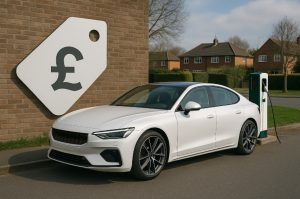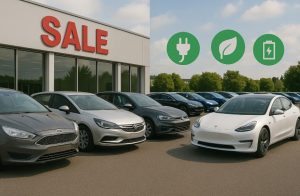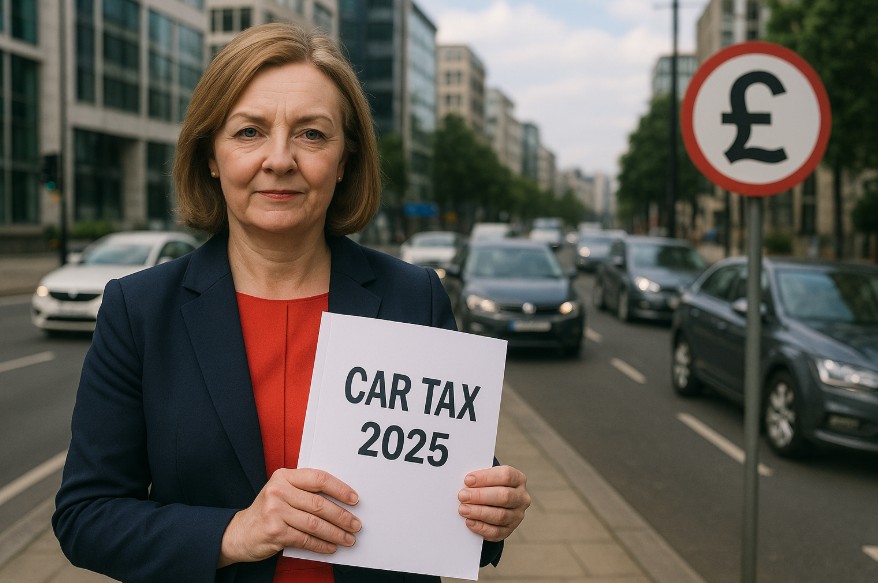In 2025, significant car tax reforms were introduced by Chancellor Rachel Reeves, marking a pivotal shift in how UK motorists are taxed. With Vehicle Excise Duty (VED) rates rising across the board and electric vehicle owners now included, these changes aim to align motoring policy with environmental goals.
From new tunnel charges to adjustments in driving test rules, drivers across the UK are seeing widespread implications. This blog breaks down all the new rules, rates, and their impact on road users.
What Are The Key Car Tax Changes Introduced By Rachel Reeves In 2025?

In 2025, Chancellor Rachel Reeves introduced sweeping updates to the Vehicle Excise Duty (VED) system in the UK. These revisions were designed to modernise how road tax is calculated, reflecting vehicle emissions and encouraging a nationwide shift to cleaner transport.
Every VED rate—whether for cars, vans, motorcycles, or hybrids—has now been adjusted in line with the Retail Price Index (RPI). This includes both first-year and standard annual rates.
The restructured tax framework aims to:
- Encourage the adoption of electric and zero-emission vehicles.
- Disincentivise ownership of high-emission petrol and diesel cars.
- Ensure long-term sustainability in road funding and environmental policy.
These changes form part of the UK Government’s wider green agenda and fiscal policy overhaul.
How Are New VED Rates Structured For Different Types Of Vehicles?
The updated VED rates for 2025 use CO2 emissions as the core metric for taxation. Vehicles emitting more pollutants will pay significantly more in the first year of registration.
Below is a table showcasing how first-year VED rates vary by emission category:
| Vehicle Type | CO2 Emissions (g/km) | First-Year VED (2025) |
| Fully Electric (Zero Emission) | 0 | £10 |
| Hybrid/Eco-Friendly | 1–50 | £110 |
| Lower Emission Vehicles | 51–75 | £130 |
| Mid-Range Emission Vehicles | 76–150 | £190–£1,565 |
| High Emission Vehicles | 151–255+ | £1,565–£5,490 |
The adjustments increase the financial pressure on owners of traditional internal combustion engine (ICE) vehicles, especially high-performance or luxury petrol and diesel models.
What Does The Expensive Car Supplement Mean For EV Owners?

A notable shift in 2025 is the removal of tax exemptions for electric vehicles over £40,000. The Expensive Car Supplement, once limited to luxury ICE vehicles, now includes premium EVs as well.
Owners of electric cars with a list price exceeding £40,000 must pay:
- A supplementary fee of £390 annually.
- This fee is applied for five years following the first registration.
The change reflects the Government’s aim to ensure equitable contributions from all vehicle owners, regardless of the powertrain. While entry-level EVs remain economical, buyers of high-end models like the Tesla Model S or Porsche Taycan will now face additional annual charges.
How Will The New Silvertown Tunnel Charges Affect Drivers?
The Silvertown Tunnel, opened in April 2025, connects Newham with the Greenwich Peninsula and introduces a new user-pay model for drivers. The tunnel operates a toll system designed to manage congestion and promote public transport.
Charges are based on time of travel and Auto Pay registration status:
- Off-Peak Rate (Auto Pay): £1.50
- Peak Hours: Higher rate applies from 6am–10am (northbound) and 4pm–7pm (southbound)
- Non-Auto Pay Users: Charged more regardless of the time
This system mirrors the Dartford Crossing toll model and complements London’s broader sustainable transport strategy.
What Changes Has The DVSA Made To Driving Tests And Appointments?
To address the long-standing backlog in driving tests, the DVSA implemented several operational changes in 2025. These aim to streamline booking systems and increase examiner availability.
Key updates include:
- A new 10-day notice requirement to cancel or amend test appointments without penalty (previously 3 days).
- Recruitment of 450 additional driving examiners across the UK.
- Improvements to the online booking platform for real-time availability updates.
These reforms are expected to reduce test waiting times and discourage the hoarding of test slots, which had become a recurring issue in recent years.
Are There Any International Policies Affecting UK Car Owners?

While Rachel Reeves’ policies focus on domestic reforms, international developments have added layers of complexity for UK drivers—particularly regarding imported vehicles.
In April 2025, US President Donald Trump reintroduced a 25% tariff on imported cars and auto parts. Though directed at the American market, the repercussions extend to UK dealerships and buyers of American-made vehicles.
International Trade Impact on UK Motoring:
| Factor | Impact on UK |
| US Auto Tariffs | Higher prices for American cars in the UK |
| Import Part Duties | Potential delays in repairs and maintenance |
| Currency Exchange Rates | Increased volatility in international pricing |
These factors may result in increased costs for specific models, particularly for UK buyers importing niche or performance vehicles from the US.
How Are Parking Fines And Traffic Penalties Changing Across London?
In April 2025, London boroughs collectively increased their penalty charges for the first time since 2011. These changes reflect inflation and the need for stronger deterrents against unlawful parking and traffic offences.
Updated penalty charges:
- Higher-level offences: Increased from £130 to £160
- Lower-level offences: Increased from £80 to £110
- Bus lane and moving traffic violations: Standardised at £160
Drivers who settle their penalty charge within 14 days are still eligible for a 50% discount, reinforcing the incentive to pay promptly.
What Do The 2025 Car Tax Changes Mean For Motorists In The UK?
The 2025 car tax reforms introduced under Chancellor Rachel Reeves have brought widespread implications for UK drivers. These policy updates reflect the Government’s focus on sustainability, fiscal balance, and emissions accountability. Here’s a closer breakdown of the major effects.
Increased Financial Responsibility For High-Emission Vehicle Owners
Drivers of petrol and diesel vehicles, especially those with higher emissions, now face significantly elevated costs. The updated VED structure makes it clear that environmental impact will cost more at the point of purchase and over the long term.
- First-year VED for high-polluting vehicles has increased to as much as £5,490.
- Cars in the 76–150g/km range now incur first-year charges of £190 to £1,565.
- Owners of older, non-compliant vehicles could see rising annual tax bills due to inflation-linked adjustments.
Electric Vehicle Owners Enter The Tax System
The 2025 changes mark the end of full tax exemption for electric vehicles (EVs), although they remain the most affordable option in terms of tax liability.
- All EVs now pay a symbolic £10 VED annually, even those with zero emissions.
- If the EV’s list price exceeds £40,000, owners pay the Expensive Car Supplement of £390 per year for five years.
This adjustment is aimed at levelling the playing field while still maintaining incentives for greener transport options.
Incentivised Transition To Zero-Emission Alternatives
Despite new EV charges, the overall tax framework still rewards motorists who opt for low-emission or electric vehicles.
- Vehicles emitting 1–50g/km of CO2 are taxed at £110 in the first year.
- Hybrids and plug-in hybrids with 51–75g/km emissions pay only £130.
- The gap between low and high emission categories has been widened to nudge buyers toward cleaner options.
This emissions-based differentiation underpins the UK’s broader Net Zero goals.
Urban Drivers Face Additional Expenses
City-based motorists are encountering more charges due to overlapping local and national policies.
- The new Silvertown Tunnel tolls apply daily between 6am and 10pm, with higher rates during peak hours.
- Parking and traffic fines in London boroughs have increased for the first time since 2011, rising up to £160.
- Expanded emission-based zones and restrictions continue to penalise older, more polluting vehicles.
These measures, while controversial, aim to reduce congestion and improve air quality in metropolitan areas.
Second-Hand Vehicle Market Adjustments
The ripple effect of tax reform is also being felt in the second-hand market, with buyers becoming more selective and tax-conscious.
- Low-emission used cars are becoming more desirable due to lower VED and running costs.
- High-emission vehicles are losing resale value as buyers avoid future tax burdens.
- Dealerships are adapting their inventory to prioritise tax-efficient models.
This shift is transforming both pricing strategies and buyer behaviour across the used car sector.
Long-Term Strategic Impact On Car Ownership
The direction of travel is clear: the UK is moving towards a more regulated, emissions-driven model of car ownership. The 2025 reforms suggest this is just the beginning.
- Regular tax revisions tied to inflation and emissions output can be expected.
- EVs may face gradually reduced incentives as their market share grows.
- Car buyers will increasingly consider not just the purchase price, but the total cost of ownership, including tax, tolls, and urban compliance.
Motorists will need to be more strategic than ever in their purchasing and usage decisions to navigate this evolving landscape efficiently.
How Will These Tax Changes Influence Vehicle Buying Trends In The UK?

The tax reforms introduced by Rachel Reeves are expected to significantly shift consumer preferences in the UK vehicle market. By increasing the cost of ownership for petrol and diesel vehicles, particularly those with high emissions, the government is nudging consumers towards greener alternatives.
Key projected trends:
- Increased demand for electric and hybrid vehicles, especially models under the £40,000 threshold to avoid the Expensive Car Supplement.
- Slower sales of high-emission vehicles, including luxury SUVs and performance cars that now attract VED charges up to £5,490 in the first year.
- Growth in the second-hand EV market, as cost-conscious buyers seek to avoid first-year tax surcharges while still accessing clean vehicle technology.
Dealerships and fleet operators are also reassessing their stock strategies, with many prioritising electric and plug-in hybrid inventory to meet evolving consumer demands and minimise future tax liabilities.
What Are The Broader Environmental And Economic Implications?
The 2025 car tax changes are not just financial adjustments—they are strategic tools to help the UK meet its Net Zero 2050 goals. By discouraging the use of high-emission vehicles, the Government aims to reduce the transport sector’s carbon footprint, which accounts for over 25% of the UK’s CO2 emissions.
Economic implications include:
- Higher annual revenues from car tax, aiding infrastructure and public transport investment.
- Potential boost to the domestic EV industry, with UK-based manufacturers benefiting from increased demand.
- Rising maintenance costs for legacy vehicle owners, as import duties on parts and emissions-based taxes increase operating expenses.
From an environmental standpoint, these policies support a shift to cleaner air in urban areas, particularly cities like London, Manchester, and Birmingham where congestion and pollution remain critical issues.
Conclusion
Rachel Reeves’ 2025 car tax changes represent more than just financial adjustments—they signal a broader push towards sustainable and equitable road use in the UK. With higher VED rates, the inclusion of electric vehicles, and reforms to infrastructure and enforcement, motorists must stay informed to avoid penalties and manage costs. As transport policies evolve, embracing cleaner alternatives and understanding new regulations will be key. These changes mark a new era for UK driving law and car ownership.
FAQs About Rachel Reeves’ Car Tax Reforms
Why is Vehicle Excise Duty increasing in 2025?
The increase aligns with inflation (RPI) and aims to incentivise drivers to adopt low-emission and electric vehicles.
Are electric vehicles still tax-free in the UK?
No. From April 2025, EVs are subject to VED and the Expensive Car Supplement if their list price exceeds £40,000.
Will car tax changes affect second-hand car owners?
Primarily, the changes target first-year VED. Ongoing annual tax for older vehicles also increases slightly in line with inflation.
How does the Silvertown Tunnel charge compare with other London tolls?
It’s relatively affordable, especially with TfL Auto Pay, but peak travel costs can add up quickly for daily commuters.
What if I cancel a driving test less than 10 days before?
You will lose your test fee unless the cancellation is due to an emergency or exceptional circumstance.
Do Rachel Reeves’ policies apply to motorcycles too?
Yes. VED rates for motorcycles have also increased, although they remain significantly lower than for cars.
How can drivers reduce their car tax burden in 2025?
Opting for low-emission vehicles, ensuring timely payments, and using Auto Pay for tolls can help reduce overall costs.








